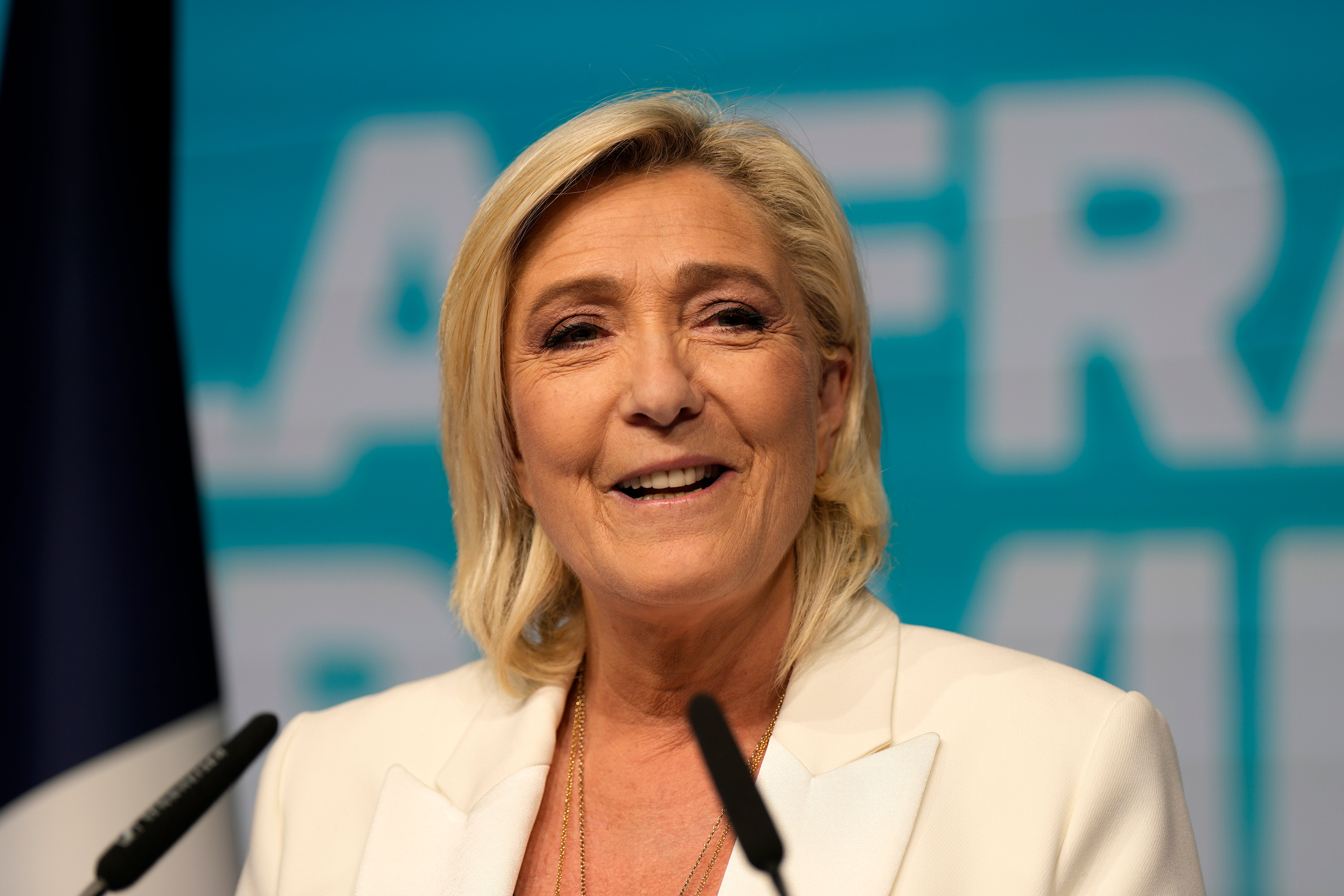Emmanuel Macron calls snap election after huge far-right gains in EU vote

The French President has said he will dissolve parliament and call a snap election after his party suffered a crushing defeat in elections for the European Parliament as surging far-right parties deal blows across the bloc.
Addressing the nation from the Elysee presidential palace on Sunday, Emmanuel Macron announced the dissolution of the National Assembly and called for legislative elections to be held on 20 June and 7 July.
Mr Macron said: “I’ve decided to give you back the choice of our parliamentary future through the vote. I am therefore dissolving the National Assembly.”
The move comes as initial projected results from France put the far-right National Rally party well ahead in the European Union’s parliamentary election, defeating Mr Macron’s pro-European centrists, according to French opinion poll institutes.
French far-right leader Marine Le Pen welcomed Mr Macron’s call for new parliamentary elections.

“We are ready to take over the power if the French give us their trust in the upcoming national elections,” she said during a rally on Sunday.
Led by 28-year-old Jordan Bardella, the National Rally won around 32 per cent of the vote in Sunday’s vote, more than double Macron ticket’s 15 per cent, according to the first exit polls.
Mr Bardella told supporters: “Emmanuel Macron is a weakened president tonight. The unprecedented gap between the presidential majority and the leading opposition party tonight reflects a stinging disavowal and rejection of the president and his government.”
Far-right parties have made big gains at the European Union parliamentary elections, also dealing a stunning defeat to another of the bloc’s most important leaders, German Chancellor Olaf Scholz.

Mr Scholz suffered such an ignominious fate that his long-established Social Democratic party fell behind the extreme-right Alternative for Germany (AfD), which surged into second place.
The four-day polls in the 27 EU countries were the world’s second-biggest exercise in democracy, behind India’s recent election.
At the end, the rise of the far right was even more stunning than many analysts predicted.
In Germany, the most populous nation in the 27-member bloc of some 450 million people, projections indicated that the AfD overcame a string of scandals involving its top candidate to rise to 16.5 per cent, up from 11 per cent in 2019.
In comparison, the combined result for the three parties in the German governing coalition barely topped 30 per cent.

Overall, across the EU, two mainstream and pro-European groups, the Christian Democrats and the Socialists, remained the dominant forces. The gains of the far right came at the expense of the Greens, who were expected to lose about 20 seats and fall back to sixth position in the legislature. Macron’s pro-business Renew group also lost big.
For decades, the European Union, which has its roots in the defeat of Nazi Germany and fascist Italy, confined the hard right to the political fringes.
With its strong showing in these elections, the far right could now become a major player in policies ranging from migration to security and climate.
The Greens were predicted to fall from 20 per cent to 12 per cent in Germany, a traditional bulwark for environmentalists, with more losses expected in France and several other EU nations.
Their defeat could well have an impact on the EU’s overall climate change policies, still the most progressive across the globe.
The centre-right Christian Democratic bloc of EU Commission president Ursula von der Leyen, which already weakened its green credentials ahead of the polls, dominated in Germany with almost 30 per cent, easily beating Mr Scholz’s Social Democrats, who fell to 14 per cent, even behind the AfD.
As well as in France, the hard right, which focused its campaign on migration and crime, was expected to make significant gains in Italy, where Premier Giorgia Meloni was tipped to consolidate her power.
Voting will continue in Italy until late in the evening and many of the 27 member states have not yet released any projections.
Nonetheless, data already released confirmed earlier predictions: the EU’s massive exercise in democracy is expected to shift the bloc to the right and redirect its future.
With the centre losing seats to hard right parties, the EU could find it harder to pass legislation and decision-making could at times be paralysed in the world’s biggest trading bloc.
EU legislators, who serve a five-year term in the 720-seat parliament, have a say in issues from financial rules to climate and agriculture policy.
They approve the EU budget, which bankrolls priorities including infrastructure projects, farm subsidies and aid delivered to Ukraine.
And they hold a veto over appointments to the powerful EU commission.
Since the last EU election in 2019, populist or far-right parties now lead governments in three nations – Hungary, Slovakia and Italy – and are part of ruling coalitions in others including Sweden, Finland and, soon, the Netherlands.
The voting marathon began in the Netherlands on Thursday, where an unofficial exit poll suggested that the anti-migrant hard right party of Geert Wilders would make important gains, even though a coalition of pro-European parties has probably pushed it into second place.
Polls give the populists an advantage in France, Belgium, Austria and Italy.
Casting his vote in the Flanders region, Belgian Prime Minister Alexander De Croo, whose country holds the EU’s rotating presidency until the end of the month, warned that Europe was “more under pressure than ever”.
This is a breaking news story…more to follow





